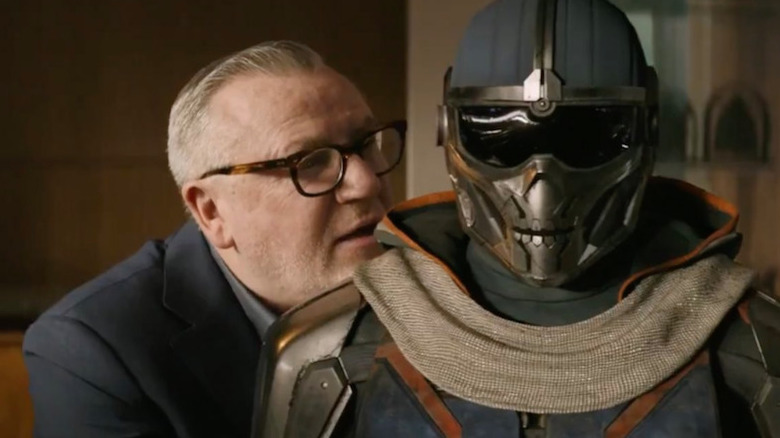Why The Hangman Game In Black Widow Is So Important
Contains spoilers for "Black Widow"
Now that "Black Widow" is finally available to see in theaters and on Disney+ with Premier Access, there's plenty to unpack about its place in the Marvel Cinematic Universe. The main story picks up in between "Captain America: Civil War" and "Avengers: Infinity War," with Natasha Romanoff (Scarlett Johansson) on the run from General Ross (William Hurt) and the military after breaking the Sokovia Accords in "Civil War." Obviously, hiding from the authorities isn't exactly easy when General Dreykov (Ray Winstone) sends hordes of brainwashed Black Widows from the Red Room after Natasha and her sister-figure Yelena Belova (Florence Pugh) — along with a deadly assassin called Taskmaster (Olga Kurylenko) thrown into the mix for good measure.
"Black Widow" serves as a way of giving the titular Avenger the spotlight that she deserves, exploring her backstory in much more detail and discussing what really happened between her and Hawkeye (Jeremy Renner) in Budapest. In fact, Natasha opens up about the mission when she and Yelena take refuge in a ventilation shaft in the roof of the Hungarian train station. The hero reveals that she and Clint Barton hid in the same vent for two days after she attacked Dreykov and his daughter Antonia, who becomes Taskmaster, as part of her defection to SHIELD.
They needed something to occupy their time up there in the vent, so they spent hours playing various games, like tic-tac-toe and Hangman. As it turns out, the game of Hangman has a deeper meaning in the context of the wider MCU.
Butterfly
The game of Hangman seen in "Black Widow" reads "B-tt–f–," clearly meant to be "butterfly." This is potentially a reference to Layla Miller, aka Butterfly, in the Marvel comics. She's a mutant who boasts a number of abilities. Most notably, she's not affected by alternate universes. That comes in handy when Butterfly is introduced during "House of M" after the Scarlet Witch loses her mind and reshapes the world to flip the social standing between humans and mutants.
Interestingly, one of Butterfly's powers allows her to seemingly resurrect the dead, albeit without a soul. It's intriguing, then, that just two films down the timeline from her solo movie, Black Widow sacrifices herself for the Soul Stone on Vormir in "Avengers: Endgame." Is Marvel already trying to figure out a way of reviving Natasha Romanoff after her heroic sacrifice? Kevin Feige only recently teased that the studio's partnership with Scarlett Johansson isn't over yet. Plus, no one ever stays dead in comics. Bucky Barnes, Captain America, Spider-Man — you get the point.
And this isn't the first time Butterfly has been referenced in the MCU. Fans might remember that "WandaVision" briefly features butterflies, with Wanda Maximoff (Elizabeth Olsen) bringing some drawings of the insects to life in Episode 3 before she gives birth to her twin sons Billy and Tommy.
The MCU has always used Easter eggs to reference deep-cut characters, places, and events in the comics, so this could just be another throwaway nod to the source material. It seems much more likely that that's the case, rather than a very obscure way of teasing Butterfly's arrival in the MCU.
Movant
Another guess in the Hang game saw the loser try to spell out "movant," someone petitions a judge to rule in a specific way. That might not mean much at first glance, but it starts to make a little more sense when putting it against the underlying story "Black Widow" is telling. Towards the end of "Black Widow," Natasha finally confronts General Dreykov on the aerial base, and the villain takes the opportunity to explain how his army of Widows allow him to essentially control the world.
Dreykov points out that with one command, he can crash the oil and stock markets, or make millions of people around the world starve to death. In this instance, Dreykov is a movant: He can force people in power to change the way they rule thanks to his army of unstoppable assassins. The villain truly believes that the world is his to control how he sees fit, which raises the stakes for Natasha a little higher than just freeing the rest of the Black Widows from under his control.
Surprisingly, that little game of Hangman in a Hungarian ventilation shaft actually had much deeper meaning than just as a way of killing time for Natasha and Clint.


